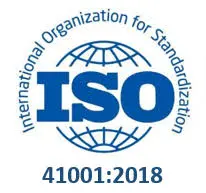
ISO 41001 Certification
ISO 41001 is an international standard that specifies the requirements for a facility management system (FMS). It provides a framework for organizations to effectively and efficiently manage facilities, ensuring they support the core business activities and objectives. This standard aims to improve the quality of facility management services, enhance customer satisfaction, and optimize the use of resources.
ISO 41001 certification demonstrates that an organization has implemented a robust facility management system that complies with international best practices. The certification is issued by accredited certification bodies after a thorough assessment of the organization’s FMS. It applies to all types of organizations, regardless of their size, sector, or geographical location.
Improved Facility Performance:
- Helps organizations optimize the performance and efficiency of their facilities, reducing operational disruptions and costs.
Enhanced Customer Satisfaction:
- Focuses on meeting customer needs and expectations, leading to improved satisfaction and loyalty.
Operational Efficiency:
- Streamlines facility management processes, improving operational efficiency and reducing waste.
Regulatory Compliance:
- Assists organizations in meeting regulatory and legal requirements related to facility management.
Risk Mitigation:
- Provides a structured approach to identifying and managing risks associated with facilities, enhancing safety and reliability.
Sustainability:
- Encourages sustainable practices, reducing environmental impact and promoting long-term sustainability.
Strategic Alignment:
- Aligns facility management activities with the organization’s strategic goals, supporting overall business success.
Stakeholder Confidence:
- Builds trust and confidence among stakeholders, including customers, employees, and regulators, by demonstrating a commitment to effective facility management.
The certification process for ISO 41001 involves several steps to ensure that the organization’s facility management system meets the standard’s requirements:
Gap Analysis:
- Conduct an initial assessment to identify gaps between the current facility management practices and the ISO 41001 requirements.
Planning and Training:
- Develop a plan to address identified gaps. Train employees on the principles and requirements of ISO 41001 and the facility management system.
Documentation:
- Create or update necessary documentation, including the facility management policy, objectives, and procedures, to comply with ISO 41001.
Implementation:
- Implement the facility management system across the organization, ensuring all processes are followed as documented.
Internal Audit:
- Conduct internal audits to evaluate the effectiveness of the facility management system and ensure compliance with ISO 41001.
Management Review:
- Top management should review the facility management system to ensure its continuing suitability, adequacy, and effectiveness.
Certification Audit:
- An accredited certification body conducts a certification audit, including a thorough review of the facility management system documentation and an on-site assessment of the implementation.
Certification Issuance:
- If the audit is successful, the certification body issues an ISO 41001 certificate, valid for three years, subject to annual surveillance audits.
Continuous Improvement and Surveillance Audits:
- Maintain the facility management system and continually improve processes. Certification bodies conduct annual surveillance audits to ensure ongoing compliance with ISO 41001.
Optimized Facility Performance:
- Enhances the performance and reliability of facilities, leading to increased productivity and reduced operational costs.
Cost Savings:
- Reduces maintenance and operational costs through effective facility management strategies and practices.
Improved Risk Management:
- Provides a structured approach to identifying and mitigating risks associated with facilities, enhancing operational resilience.
Enhanced Customer Experience:
- Focuses on delivering high-quality facility management services that meet customer needs and expectations.
Regulatory Compliance:
- Assists in meeting regulatory and legal requirements related to facility management, reducing the risk of non-compliance and associated penalties.
Sustainability:
- Promotes sustainable facility management practices, reducing environmental impact and contributing to long-term sustainability goals.
Strategic Planning:
- Aligns facility management activities with the organization’s strategic goals, supporting overall business success.
Stakeholder Trust:
- Builds trust and confidence among stakeholders by demonstrating a commitment to effective and responsible facility management.
- Corporate Offices: To ensure the efficient and effective management of office facilities, enhancing employee productivity and satisfaction.
- Healthcare Facilities: To maintain and optimize medical facilities and equipment, ensuring the highest standards of care.
- Educational Institutions: To manage educational facilities effectively, supporting the quality of education and administrative processes.
- Manufacturing Plants: To optimize the performance and reliability of production facilities and equipment.
- Public Sector Organizations: To ensure the efficient and sustainable management of public facilities and infrastructure.
- Retail and Hospitality: To enhance the customer experience through effective facility management in retail stores, hotels, and restaurants.
Our most Honorable Clients
















Join Us
Global Certifications
Have questions about our certification process? Need guidance on which certification suits your needs? We’re here to help every step of the way.
Testimonial





